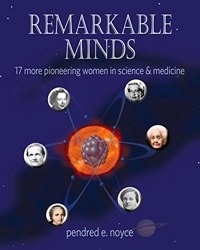 THE LOVE HATERS |
 Fall headfirst into July’s hottest stories—danger, desire, and happily-ever-afters await. |

Purchase
Tumblehome Learning, Inc. Non-Fiction Biography, Non-Fiction History Excerpt of Remarkable Minds by Pendred NoyceIn many ways, Irène Joliot-Curie’s life echoed that of her mother, the famous physicist Marie Curie. Like Marie, Irène lost a parent at an early age, married a fellow scientist, won a Nobel Prize with her husband, taught at the Sorbonne, was refused admission to the French Academy of Sciences, and died of a radiation-induced blood disease. Calm and dedicated, Irène never appeared daunted by her parents’ fame. She freely chose her life in physics. “That one must do some work seriously and must be independent and not merely amuse oneself in life—this our mother has told us always, but never that science was the only career worth following,” she said. Irène Curie was born one month prematurely on September 12, 1897, in Paris, just after her parents returned from a long bicycle ride. In 1897, Marie Curie was just beginning the study of uranium rays that would lead to her great discoveries. To help care for the baby while her parents spent long hours in the laboratory, Pierre’s father, Dr. Eugène Curie, came to live with the family. Irène adored him. He taught her about nature and introduced her to the socialist ideals she carried through her life. Marie carefully recorded Irène’s growth and development. On vacations in Brittany, Irène’s father Pierre took her on walks or bicycle rides, pointing out plants and animals and talking to her about mathematics. Both parents believed that children’s education should include plenty of fresh air and exercise. When Irène was six years old, her parents won the Nobel Prize in Physics for their discovery of radioactivity, although they did not travel to Stockholm to collect the prize for another two years. Irène’s sister Eve, who grew up to be a talented musician and writer with no interest in science, was born the year after the Nobel award. Two years after Eve’s birth, when Irène was nine years old, their father Pierre was killed in a sudden accident, run over in the street by a heavy, horse-drawn cart. Their mother took over teaching Pierre’s course in physics at the Sorbonne. Otherwise she withdrew into mourning and did little but go to her laboratory and visit the cemetery in the nearby village of Sceaux. Eventually she moved the family into the village to be closer to the cemetery. Once in Sceaux, Marie pulled herself together enough to help organize a cooperative school with other Sorbonne professors, including Pierre’s former student, Paul Langevin. Eminent scholars taught each other’s children mathematics, science, Chinese, sculpture, or whatever else interested both teachers and pupils. The children were also physically active. “We did gymnastics, swimming, bicycling, horseback riding . . . we rowed, we skated,” Irène remembered. But sorrow continued to visit. At thirteen, Irène lost another father figure with the death of her beloved grandfather. The following year, scandal broke over the family when the tabloid press in Paris published a series of letters, perhaps partly forged, between the widowed Marie Curie and the married Paul Langevin. Newspapers demanded that the “foreign” home-breaker, Marie Curie, return to her native Poland, and crowds threw rocks at the windows of the family’s house. Marie and her terrified daughters sought refuge in the home of friends, Emile and Marguerite Borel. Excerpt from Remarkable Minds by Pendred Noyce |
|
| |||
|
||||




 © 2003-2025
© 2003-2025